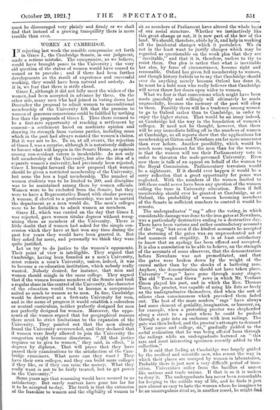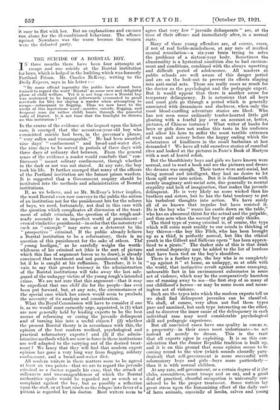WOMEN AT CAMBRIDGE.
TN rejecting last week the sensible compromise set forth .1 in Grace I., the Cambridge Senate, in our judgment, made a serious mistake. The compromise, as we believe, would have brought peace to the University ; the very old question of the status of women would have ceased to wound or to provoke ; and if there had been further developments as the result of experience and successful working, they would have been natural and orderly. As it is, we fear that there is strife ahead.
Grace I., although it did not fully meet the wishes of the women, had been accepted in advance by them. On the other side, many men who had joined in voting down last December the proposal to admit women to unconditional membership of the University felt that the promise to women of generous concessions could be fulfilled by nothing less than the proposals of Grace I. Thus there seemed to be a first-rate opportunity of reaching a settlement by consent—a settlement based on moderate opinion and drawing its strength from various parties, including some which in the past had always resisted the women's claims. But it was not to be. To us, at all events, the rejection of Grace I. was a surprise, although it is notoriously difficult to foresee what will happen in the Senate House, as opinion among non-resident voters is incalculable. As not only full membership of the University, but also the idea of a separate women's university, had previously been rejected, Grace I. brought forward the new proposal that women should be given a restricted membership of the University, but none the less a legal membership. The number of women students was to be limited to 500, and discipline was to be maintained among them by women officials. Women were to be excluded from the Senate, but they were to have a Representative Board with similar powers. A woman, if elected to a professorship, was not to control the department as a man would do. The men's colleges were to be forbidden to admit women as members.
Grace H., which was carried on the day that Grace I. was rejected, gave women titular degrees without recog- nizing them as members of the University. There is little doubt that if women had asked for the simple con- cession which they have at last won any time during the past few years they would have been granted it. But they asked for more, and personally we think they were quite justified. Let us try to do justice to the women's opponents. Their point of view is intelligible. They argued that Cambridge, having been founded as a men's University, must remain a men's University, unless, indeed, it was to become a co-education institution, which nobody really wanted. Nobody desired, for instance, that men and women should mingle in the same college. They argued that if the women became members of the Senate and took a regular share in the control of the University, the character of the education would tend to beethne a compromise suited as much to women as to men. In fine, Cambridge would be destroyed as a first-rate University for men, and in the name of progress it would establish a colourless or neutral curriculum, neither perfectly designed for men nor perfectly designed for women. Moreover, the oppo- nents of the women argued that for geographical reasons there must be strict limitations to the expansion of the University. They pointed out that the men already found the University overcrowded, and they declared that if women were freely allowed to join the University the congestion might become disastrous. " All that justice requires us to give to women," they said, in effect, " is degrees by diploma. That will prove that they have passed their examinations to the satisfaction of the Cam- bridge examiners. What more can they want I They have their own colleges, and they can build more colleges if they like, or if they can raise the money. What they really want is not to be fairly treated, but to get power in the University." Some years ago that reasoning would have seemed to us satisfactory. But surely matters have gone too far for it to be accepted to-day. The truth is that the extension of the franchise to women and the eligibility of women to sit as members of Parliament have altered the whole basis of our social structure. Whether we instinctively like this great change or not, it is now part of the law of the land. We should, therefore, abide by it, and help in. working all the incidental changes which it postulates. We de not in the least want to justify changes which may be regarded as questionable on the weak plea that they are inevitable," and that it is, therefore, useless to try to resist them. Our plea is rather that what is inevitable has also, by force of circumstances, become right and reasonable. Oxford has given full membership to women, and though history forbids us to say that Cambridge should ever do anything merely because Oxford has done it, he must be a bold man who really believes that Cambridge will never throw her doors open wider to women. What we fear is that concessions which might have been made gracefully and willingly will ultimately be made ungracefully, because the memory of the past will cling to them. Possibly there will be a tendency among women togo to Oxford rather than to Cambridge, in order to enjoy the higher status. That would be an irony indeed, as Cambridge led the way in the foundation of women's colleges. It need not be thought, however, that there will be any immediate falling off in the numbers of women at Cambridge, as all reports show that the applications bps membership at Girton and Newnham are far more numerous than ever before. Another possibility, which would be much more unpleasant for the men than for the women, is that the women will use their Parliamentary vote in order to threaten the male-governed University. Even now there is talk of an appeal on behalf of the women to the Royal Commission. Parliamentary terrorism would be a nightmare. If it should ever happen it would be a sorry reflection that a great opportunity for peace was neglected. With the numbers of the women limited to 500 there could never have been any question of the women calling the tune in University education. Even if full membership should ever be granted at Cambridge, as at Oxford, the probability of women becoming members of the Senate in sufficient numbers to control it would be remote.
The undergraduates' " rag " after the voting, in which considerable damage was done to the iron gates at Newnham, was a particularly destructive ending to a destructive day. There have been various and rather contradictory accounts of the " rag," but even if the kindest accounts be accepted the storming of the gates was • an unprecedented act of .bad manners and stupidity. It is at least satisfactory to know that an apology has been offered and accepted. It is also a consolation to be able to believe, on the strength of the accounts of some observers, that the demonstration before Newnham was not premeditated, and that the gates were broken down by the weight of the crowd rather than by the shocks of a battering ram. Anyhow, the demonstration should not have taken place. University " rags " have gone through many stages. The old " Town and Gown " rows in which Mr. Verdant Green played his part, and in which the Rev. Thomas Tozer, the proctor, was capable of using his fists as freely as the undergraduates themselves, died when the sort of odious class consciousness which provoked them faded out. The best of the more modern " rags " have always had some element of geniality, imagination, or humour, as, for example, when a protesting proctor was shepherded along a street to a point where he could be pushed through a gate into an enclosure with iron railings. The gate was then locked, and the proctor's attempts to demand " Your name and college, sir," gradually yielded to the awful realization that he was being offered buns through the railings while an undergraduate lectured on " this rare and most interesting specimen recently added to the collection."
It is said that feeling at Cambridge was largely guided by the medical and scientific men, who resent the way in which their places are usurped by women in laboratories. Probably there is just now a very difficult period of tran- sition. Universities suffer from the bacillus of unrest like nations and trade unions. If that is so it is useless to deny it. The undergraduate has never been remarkable for keeping to the middle way of life, and he finds it just now almost as easy to hate the woman whom he imagines to be an unscrupulous rival as, in another mood, he might find, it easy to flirt with her. But no explanations and excuses can atone for the ill-conditioned behaviour. The offence against Newnham was the worse because the women were the defeated party.







































 Previous page
Previous page